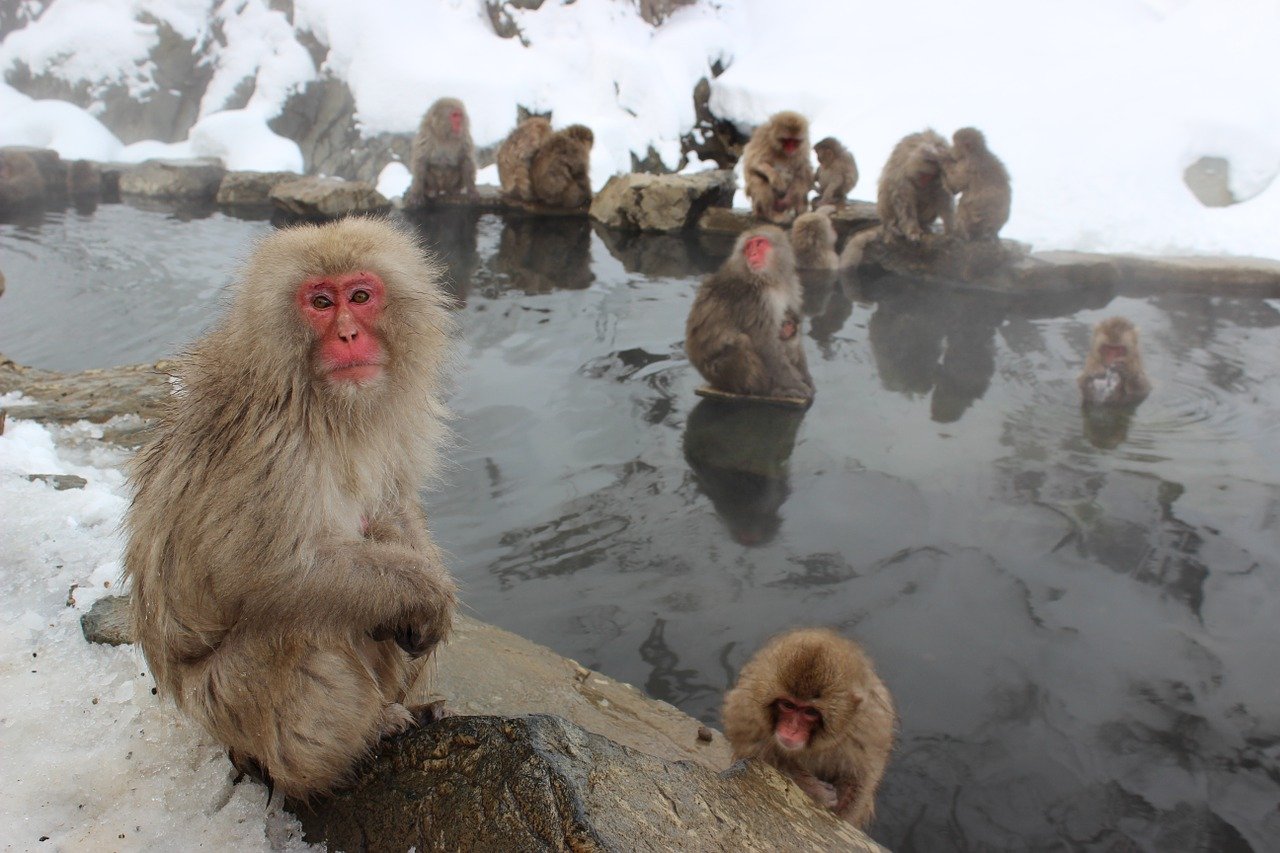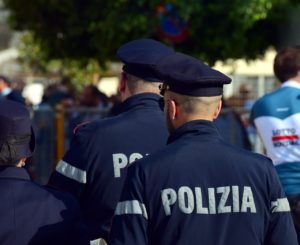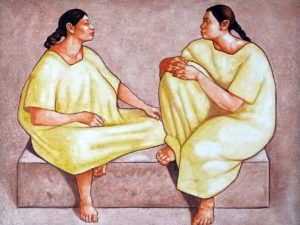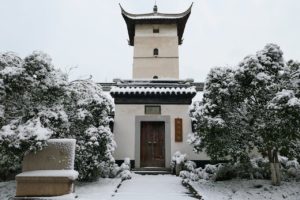ペットを飼っていますか。Petto o katte imasu ka. Do you have any pets?
People keep all sorts of animals as pets, but the most common ones are 犬 inu a dog, 猫 neko a cat, 金魚 kingyo a goldfish, インコ inko a parakeet, オウム oumu a parrot, ハムスター hamusutaa a hamster. Something that isn’t usually a pet but that you can often find in or around buildings is: ネズミ nezumi, which can mean either a mouse or a rat.
- 犬と猫を飼っています。
Inu to neko o katte imasu.
We have a dog and a cat. - {犬・猫}の名前は何ですか。
{Inu/Neko} no namae wa nan desu ka.
What’s your dog’s/cat’s name? - 子犬と遊んでいます。
Koinu to asonde imasu.
I’m playing with our puppy.
- 子猫をなでています。
Koneko o nadete imasu.
I’m petting our kitten. - 犬は噛みますか。
Inu wa kamimasu ka.
Does your dog bite? - 猫は引っかきますか。
Neko wa hikkakimasu ka.
Does your cat scratch? - 金魚鉢で金魚を飼っています。
Kingyobachi de kingyo o katte imasu.
I have a goldfish in a fishbowl. - 水槽で魚をたくさん飼っています。
Suisou de sakana o takusan katte imasu.
I have a lot of fish in an aquarium. - ケージでハムスターを二匹飼っています。
Keeji de hamusutaa o nihiki katte imasu.
We have two hamsters in a cage. - 私のオウムはよく喋ります。
Watashi no oumu wa yoku shaberimasu.
My parrot talks a lot. - ネズミを見たとき、悲鳴をあげました。
Nezumi o mita toki, himei o agemashita.
I screamed when I saw a mouse.
犬はどんな鳴き声ですか。Inu wa don’na nakigoe desu ka. What sound does a dog make?
In English, dogs say “woof” and cats say “meow,” but of course that’s all different in Japanese. Notice that you can use the verb 鳴きます nakimasu to mean meow, moo, crow, etc.
- 犬は吠えます。犬は「ワンワン!」と吠えます。
Inu wa hoemasu. Inu wa “Wan wan!” to hoemasu.
Dogs bark. A dog says “Woof!”
- 猫は鳴きます。猫は「ニャーニャー!」と鳴きます。
Neko wa nakimasu. Neko wa “Nyaa nyaa!” to nakimasu.
Cats meow. A cat says “Meow!” - 鳥はさえずります。
Tori wa saezurimasu.
Birds chirp. - 牛は鳴きます。牛は「モーモー」と鳴きます。
Ushi wa nakimasu. Ushi wa “moo moo” to nakimasu.
Cows moo. A cow says “moo.” - おんどりは鳴きます。おんどりは「コケコッコー」と鳴きます。
Ondori wa nakimasu. Ondori wa “kokekokkoo” to nakimasu.
Roosters crow. A rooster says “cock-a-doodle-do.” - {あひる・鴨}は鳴きます。あひるは「ガーガー」と鳴きます。
{Ahiru/Kamo} wa nakimasu. Ahiru wa “gaa gaa” to nakimasu.
Ducks quack. A duck says “quack.” - 豚は鳴きます。豚は「ブーブー」と鳴きます。
Buta wa nakimasu. Buta wa “buu buu” to nakimasu.
Pigs squeal. A pig says “oink oink.” - 犬は怒っている時にうなります。
Inu wa okotte iru toki ni unarimasu.
Dogs growl when they’re angry. - 猫はうれしい時にゴロゴロいいます。
Neko wa ureshii toki ni goro goro iimasu.
Cats purr when they’re happy.
農場で noujou de: On the Farm
The most usual animals on a farm are: 馬 uma a horse, 牛 ushi a cow, 雄牛 oushi a bull, 豚 buta a pig, 羊 hitsuji a sheep, 鶏 niwatori a chicken, ガチョウ gachou a goose, ヤギ yagi a goat, ロバ roba a donkey.
- 馬は牧草地を走っています。
Uma wa bokusouchi o hashitte imasu.
The horse is running in the pasture. - 牛は家畜小屋にいます。
Ushi wa kachikugoya ni imasu.
The cows are in the barn. - 豚は泥の中に横たわっています。
Buta wa doro no naka ni yokotawatte imasu.
The pigs are lying in the mud. - 鶏は鶏小屋にいます。
Niwatori wa niwatorigoya ni imasu.
The chickens are in the coop. - 農夫は牛の乳搾りをします。
Noufu wa ushi no chichishibori o shimasu.
The farmer milks the cows. - 鶏は卵を産みます。
Niwatori wa tamago o umimasu.
Chickens lay eggs. - ウールは羊からとれます。
Uuru wa hitsuji kara toremasu.
Wool comes from sheep.
Some other words related to animals that you want to know are: 毛 ke fur, 鱗 uroko scales, しっぽ shippo a tail, 蹄 hizume a hoof, 角 tsuno a horn, 羽 hane a feather, たてがみ tategami a mane, 爪 tsume a claw.
- 馬はきれいなたてがみがあります。
Uma wa kirei na tategami ga arimasu.
The horse has a beautiful mane. - ガチョウは白い羽を持っています。
Gachou wa shiroi hane o motte imasu.
The goose has white feathers. - 雄牛は角があります。
Oushi wa tsuno ga arimasu.
Bulls have horns. - 豚のしっぽは小さいです。
Buta no shippo wa chiisai desu.
The pig has a little tail. - どの動物に蹄がありますか。
Dono doubutsu ni hizume ga arimasu ka.
Which animals have hooves? - 気を付けて!猫は爪が鋭いです。
Ki o tsukete! Neko wa tsume ga surudoi desu.
Be careful! The cat has sharp claws.
鳥 tori Birds
Here’s some vocabulary for our feathered friends: 鳥 tori a bird, アヒル、鴨 ahiru, kamo a duck, 鷲 washi an eagle, 鷹 taka a hawk, 鳩 hato a pigeon, 七面鳥 shichimenchou a turkey, 孔雀 kujaku a peacock, 白鳥 hakuchou a swan, ふくろう fukurou an owl, かもめ kamome a seagull.
- 鳥の鳴き声が聞こえますか。
Tori no nakigoe ga kikoemasu ka.
Do you hear the birds? - 湖の横に{アヒル・鴨}がいます。
Mizuumi no yoko ni {ahiru/kamo} ga imasu.
There are some ducks next to the lake. - 鷲は空高く飛びます。
Washi wa soratakaku tobimasu.
Eagles fly very high. - 孔雀はきれいな羽をしています。
Kujaku wa kirei na hane o shite imasu.
Peacocks have beautiful feathers. - 公園にたくさんの鳩がいます。
Kouen ni takusan no hato ga imasu.
There are a lot of pigeons in the park. - 白鳥はとても優雅な動物です。
Hakuchou wa totemo yuuga na doubutsu desu.
Swans are very elegant animals. - ふくろうが森で鳴いています。
Fukurou ga mori de naite imasu.
An owl is hooting in the woods. - かもめは海岸の上空を飛びます。
Kamome wa kaigan no joukuu o tobimasu.
The seagulls are flying over the beach.
野生動物 yasei doubutsu: Wild Animals
The most common wild animals around the world are these: 鹿 shika a deer, 熊 kuma a bear, 狼 ookami a wolf, 狐 kitsune a fox, コヨーテ koyoote a coyote, アライグマ araiguma a raccoon, リス risu a squirrel, うさぎ usagi a rabbit, こうもり koumori a bat, 蛇 hebi a snake, とかげ tokage a lizard. In Japan, you may also want to know ニホンザル nihonzaru, “Japan monkey” or the Japanese macaque.
- 鹿は野原で草を食べています。
Shika wa nohara de kusa o tabete imasu.
The deer are eating grass in the field. - 狐は森の中へ走って行きました。
Kitsune wa mori no naka e hashitte ikimashita.
A fox ran into the woods. - ハイキングをしていた時、熊を見ました。
Haikingu o shite ita toki, kuma o mimashita.
We saw a bear when we were hiking. - 狼は夜に吠えます。
Ookami wa yoru ni hoemasu.
Wolves howl at night. - リスは素早く木に登ります。
Risu wa subayaku ki ni noborimasu.
Squirrels climb trees very quickly. - ここにアライグマはいますか。
Koko ni araiguma wa imasu ka.
Are there raccoons here? - こうもりは日が暮れてから出てきます。
Koumori wa hi ga kurete kara dete kimasu.
Bats come out after sunset. - 気を付けて!この道には蛇がいます。
Ki o tsukete! Kono michi ni wa hebi ga imasu.
Be careful! There’s a snake on the path.
動物園で doubutsuen de: At the Zoo
Depending on where you live, you may not need to go to a zoo to see these animals. But for most of us, a zoo is the only place where we’ll see these: 象 zou an elephant, ライオン raion a lion, 虎 tora a tiger, きりん kirin a giraffe, しまうま shimauma a zebra, サイ sai a rhinoceros, 猿 saru a monkey, ゴリラ gorira a gorilla, カバ kaba a hippopotamus.
- 象は鼻と長い牙があります。
Zou wa hana to nagai kiba ga arimasu.
Elephants have trunks and long tusks. - ライオンは吠えてうなります。
Raion wa hoete unarimasu.
Lions roar and snarl. - 虎は縞模様があります。
Tora wa shimamoyou ga arimasu.
Tigers have stripes. - キリンは首がとても長いです。
Kirin wa kubi ga totemo nagai desu.
Giraffes have very long necks. - しまうまは黒と白の縞模様があります
Shimauma wa kuro to shiro no shimamoyou ga arimasu.
Zebras have black and white stripes. - サイはとても大きな角があります。
Sai wa totemo ookina tsuno ga arimasu.
Rhinos have very big horns. - 猿はよく木の上で過ごします。
Saru wa yoku ki no ue de sugoshimasu.
Monkeys spend a lot of time in trees. - ゴリラは人間にとても近いです。
Gorira wa ningen ni totemo chikai desu.
Gorillas are very similar to people. - カバはとても速く走ります!
Kaba wa totemo hayaku hashirimasu!
Hippos run very fast!
水の中 mizu no naka: In the Water
If you live near a lake or river, you may see some of these: 魚 sakana a fish, 蛙 kaeru a frog, 亀 kame a turtle, ビーバー biibaa a beaver, かたつむり katatsumuri a snail, ワニ wani an alligator/a crocodile.
- この湖にどんな魚がいますか。
Kono mizuumi ni don’na sakana ga imasu ka.
What kind of fish live in this lake? - あの岩の上に亀がいます。
Ano iwa no ue ni kame ga imasu.
There’s a turtle on that rock. - 夏は夜に蛙の鳴き声が聞こえます。
Natsu wa yoru ni kaeru no nakigoe ga kikoemasu.
We hear frogs at night in the summer. - かたつむりはゆっくりゆっくり進みます。
Katatsumuri wa yukkuri yukkuri susumimasu.
Snails move very, very slowly. - ビーバーは木をかじってダムを作ります。
Biibaa wa ki o kajitte damu o tsukurimasu.
Beavers chew trees and make dams.
In the ocean, you may see: サメ same a shark, クジラ kujira a whale, イルカ iruka a dolphin, カニ kani a crab, ロブスター robusutaa a lobster, くらげ kurage a jellyfish, ヒトデ hitode a starfish, うに uni a sea urchin, うなぎ unagi an eel, あさり asari a clam, ムール貝 muurugai a mussel, エビ ebi a shrimp たこ tako an octopus, いか ika a squid.
- サメが怖いですから、海で泳ぎません!
Same ga kowai desu kara, umi de oyogimasen!
I’m afraid of sharks, so I don’t swim in the ocean! - 海岸近くでイルカが泳いでいるのを見ました。
Kaigan chikaku de iruka ga oyoide iruno o mimashita.
We saw dolphins swimming near the beach. - 今日は泳ぎません。クラゲがたくさんいます。
Kyou wa oyogimasen. Kurage ga takusan imasu.
We’re not swimming today. There are too many jellyfish. - 海岸でヒトデを見つけました。
Kaigan de hitode o mitsukemashita.
We found a starfish on the beach. - 痛い!うにを踏んでしまいました。痛いです!
Itai! Uni o funde shimaimashita. Itai desu!
Ouch! I stepped on a sea urchin. That’s painful! - その岩の辺りにカニがたくさんいます。
Sono iwa no atari ni kani ga takusan imasu.
There are a lot of crabs near those rocks. - あさりは砂の中に生息しています。
Asari wa suna no naka ni seisokushite imasu.
Clams live in the sand. - ムール貝は岩の上に生息しています。
Muurugai wa iwa no ue ni seisokushite imasu.
Mussels live on rocks.
昆虫とそのほかの小さな生き物 konchuu to sono hoka no chiisana ikimono: Insects and Other Small Creatures
If you every need to talk about insects, bugs, or other creep-crawlies, you will need to know these: 虫 mushi a bug, クモ kumo a spider, 蜂 hachi a bee, カブトムシ kabutomushi a beetle, てんとう虫 tentoumushi a ladybug, 蠅 hae a fly, 蚊 ka a mosquito, 蝶 chou a butterfly, 蛾 ga a moth, ミミズ mimizu a worm, サソリ sasori a scorpion, 蟻 ari an ant.
- 虫は嫌いです!
Mushi wa kirai desu!
I don’t like bugs! - 大きなクモが寝室の壁を這っています!
Ookina kumo ga shinshitsu no kabe o hatte imasu!
There’s a big spider crawling on the wall in my bedroom! - 今夜は蚊によく刺されます。
Kon’ya wa ka ni yoku sasaremasu.
The mosquitos are biting me tonight. - 蜂に刺されました!
Hachi ni sasaremashita!
I was stung by a bee! - 蝶はきれいでカラフルです。
Chou wa kirei de karafuru desu.
Butterflies are beautiful and colorful. - 蛾は夜に電気の周りを飛びます。
Ga wa yoru ni denki no mawari o tobimasu.
Moths fly around lights at night. - ミミズは土の中に生息しています。
Mimizu wa tsuchi no naka ni seisokushite imasu.
Worms live in the soil. - テントウムシは黒と赤です。
Tentoumushi wa kuro to aka desu.
Ladybugs are black and red. - 気をつけて!ここにサソリがいます。
Ki o tsukete! Koko ni sasori ga imasu.
Be careful! There are scorpions here.
Learn Japanese with the Language Garage
Check out our other posts on Japanese language, culture, and more. And if you’re looking for convenient and affordable live Japanese lessons with a real teacher, check out the Language Garage. Our lessons are given online in a virtual classroom, so it doesn’t matter where you live or work – we can come to you. And we have flexible options, with a free trial so that you can decide if there’s a fit. Check us out!
Free Student Book and Audio
You can access our original student book and practice audio here. If you’d like to use it with an instructor, you can enroll in lessons. Or you can use it on your own as self-study, totally free.
Image by Andrew Tan from Pixabay.





